Clinical Placement: Simulated Mental Health Client Care Assessment
VerifiedAdded on 2023/04/26
|18
|4264
|339
Case Study
AI Summary
This assignment presents a simulated mental health client care setting assessment, focusing on two cases: a 57-year-old woman with bipolar disorder and a 32-year-old woman with a history of depression, anemia, diabetes, end-stage renal disease, hypertension, and polysubstance abuse. The assessment addresses various aspects of mental health care, including the symptoms and cognitive deficits associated with bipolar disorder, challenging behaviors, the impact of mental illness on social activities, recovery-oriented mental health services, evidence-based practices, consumer perspectives, stigmas related to mental illness, legal protections for mental health patients, and effective treatment strategies. It also covers the psychological aspects of depression and cognitive therapy techniques. The assignment highlights the importance of therapeutic communication, patient care, and addressing oral health issues in mental health patients. This document is available on Desklib, a platform offering past papers and solved assignments for students.
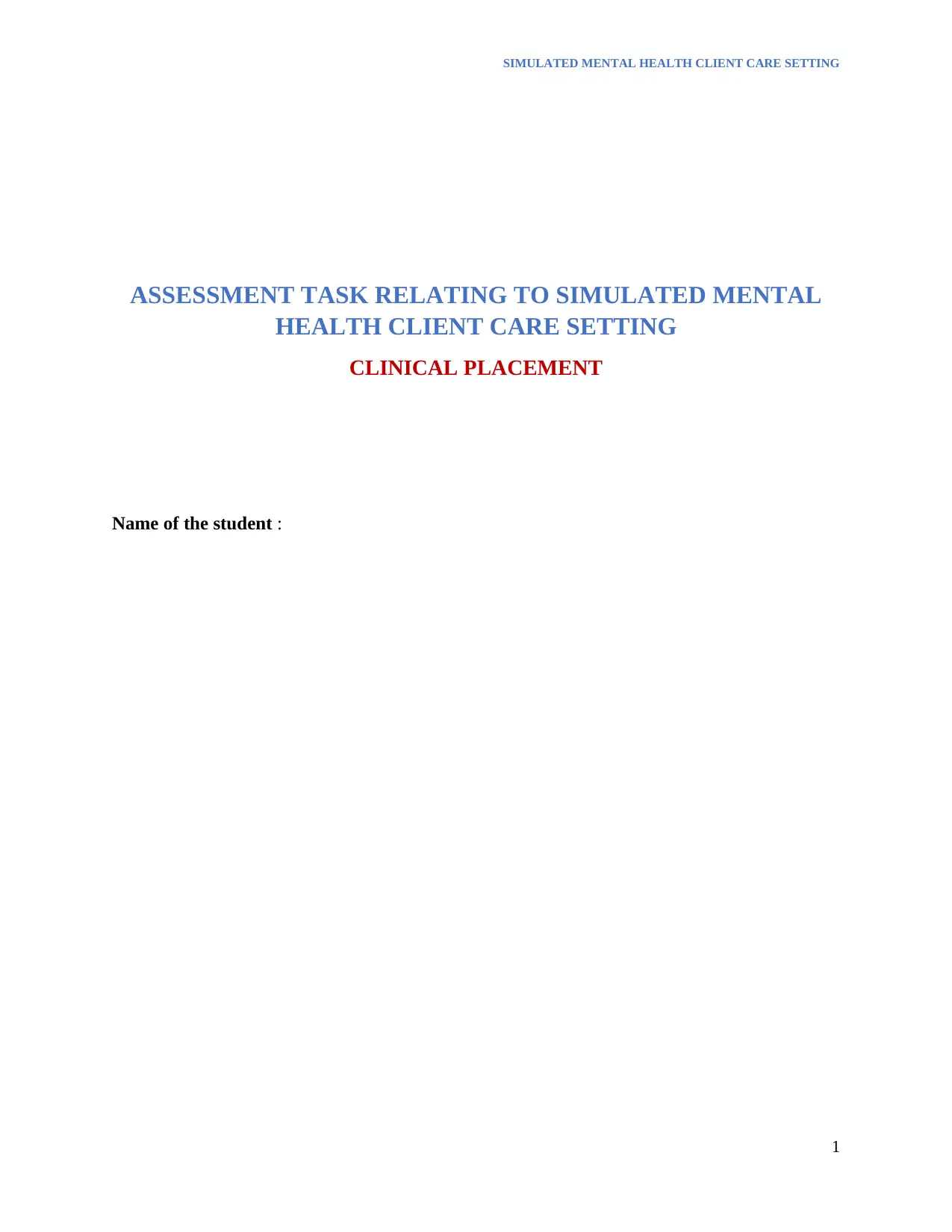
SIMULATED MENTAL HEALTH CLIENT CARE SETTING
ASSESSMENT TASK RELATING TO SIMULATED MENTAL
HEALTH CLIENT CARE SETTING
CLINICAL PLACEMENT
Name of the student :
1
ASSESSMENT TASK RELATING TO SIMULATED MENTAL
HEALTH CLIENT CARE SETTING
CLINICAL PLACEMENT
Name of the student :
1
Paraphrase This Document
Need a fresh take? Get an instant paraphrase of this document with our AI Paraphraser
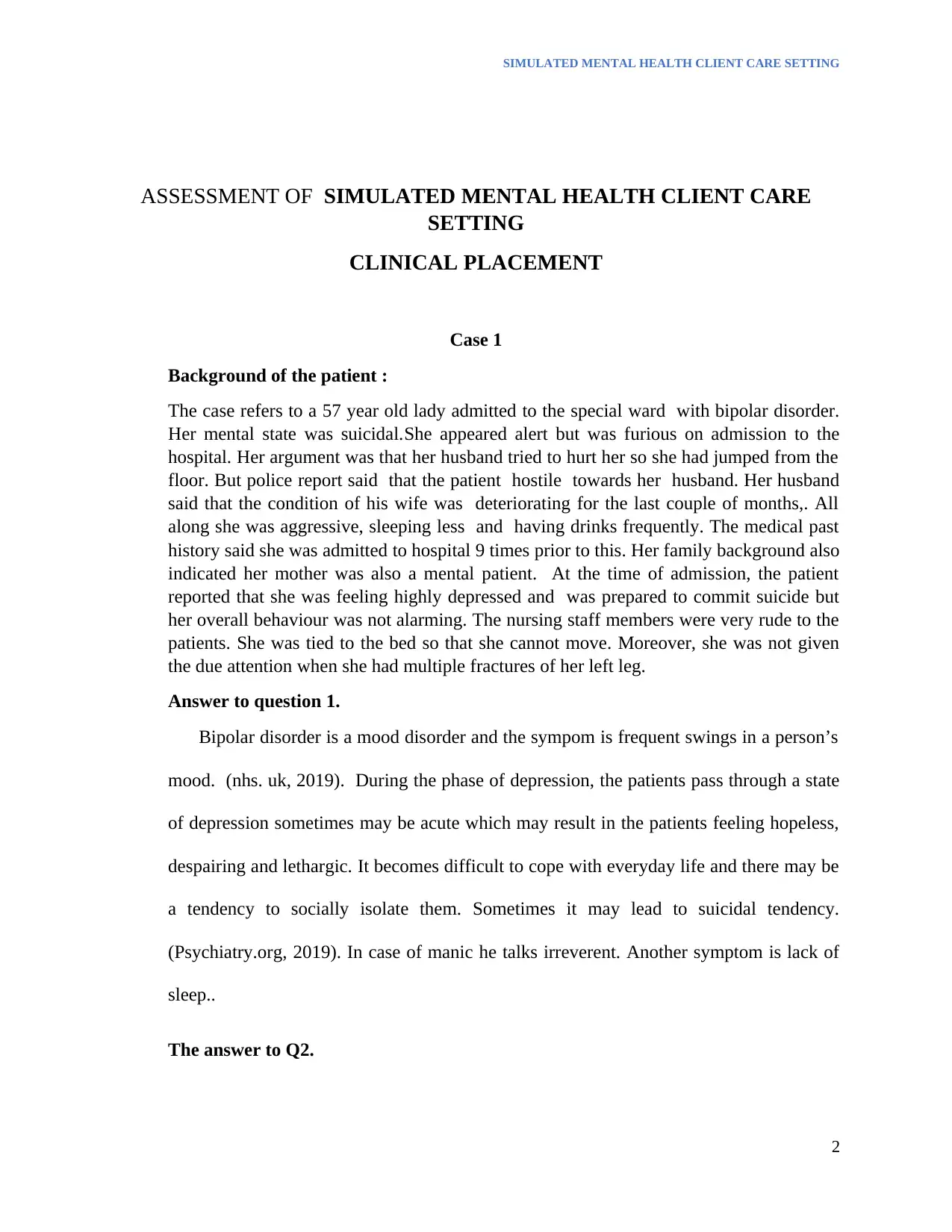
SIMULATED MENTAL HEALTH CLIENT CARE SETTING
ASSESSMENT OF SIMULATED MENTAL HEALTH CLIENT CARE
SETTING
CLINICAL PLACEMENT
Case 1
Background of the patient :
The case refers to a 57 year old lady admitted to the special ward with bipolar disorder.
Her mental state was suicidal.She appeared alert but was furious on admission to the
hospital. Her argument was that her husband tried to hurt her so she had jumped from the
floor. But police report said that the patient hostile towards her husband. Her husband
said that the condition of his wife was deteriorating for the last couple of months,. All
along she was aggressive, sleeping less and having drinks frequently. The medical past
history said she was admitted to hospital 9 times prior to this. Her family background also
indicated her mother was also a mental patient. At the time of admission, the patient
reported that she was feeling highly depressed and was prepared to commit suicide but
her overall behaviour was not alarming. The nursing staff members were very rude to the
patients. She was tied to the bed so that she cannot move. Moreover, she was not given
the due attention when she had multiple fractures of her left leg.
Answer to question 1.
Bipolar disorder is a mood disorder and the sympom is frequent swings in a person’s
mood. (nhs. uk, 2019). During the phase of depression, the patients pass through a state
of depression sometimes may be acute which may result in the patients feeling hopeless,
despairing and lethargic. It becomes difficult to cope with everyday life and there may be
a tendency to socially isolate them. Sometimes it may lead to suicidal tendency.
(Psychiatry.org, 2019). In case of manic he talks irreverent. Another symptom is lack of
sleep..
The answer to Q2.
2
ASSESSMENT OF SIMULATED MENTAL HEALTH CLIENT CARE
SETTING
CLINICAL PLACEMENT
Case 1
Background of the patient :
The case refers to a 57 year old lady admitted to the special ward with bipolar disorder.
Her mental state was suicidal.She appeared alert but was furious on admission to the
hospital. Her argument was that her husband tried to hurt her so she had jumped from the
floor. But police report said that the patient hostile towards her husband. Her husband
said that the condition of his wife was deteriorating for the last couple of months,. All
along she was aggressive, sleeping less and having drinks frequently. The medical past
history said she was admitted to hospital 9 times prior to this. Her family background also
indicated her mother was also a mental patient. At the time of admission, the patient
reported that she was feeling highly depressed and was prepared to commit suicide but
her overall behaviour was not alarming. The nursing staff members were very rude to the
patients. She was tied to the bed so that she cannot move. Moreover, she was not given
the due attention when she had multiple fractures of her left leg.
Answer to question 1.
Bipolar disorder is a mood disorder and the sympom is frequent swings in a person’s
mood. (nhs. uk, 2019). During the phase of depression, the patients pass through a state
of depression sometimes may be acute which may result in the patients feeling hopeless,
despairing and lethargic. It becomes difficult to cope with everyday life and there may be
a tendency to socially isolate them. Sometimes it may lead to suicidal tendency.
(Psychiatry.org, 2019). In case of manic he talks irreverent. Another symptom is lack of
sleep..
The answer to Q2.
2
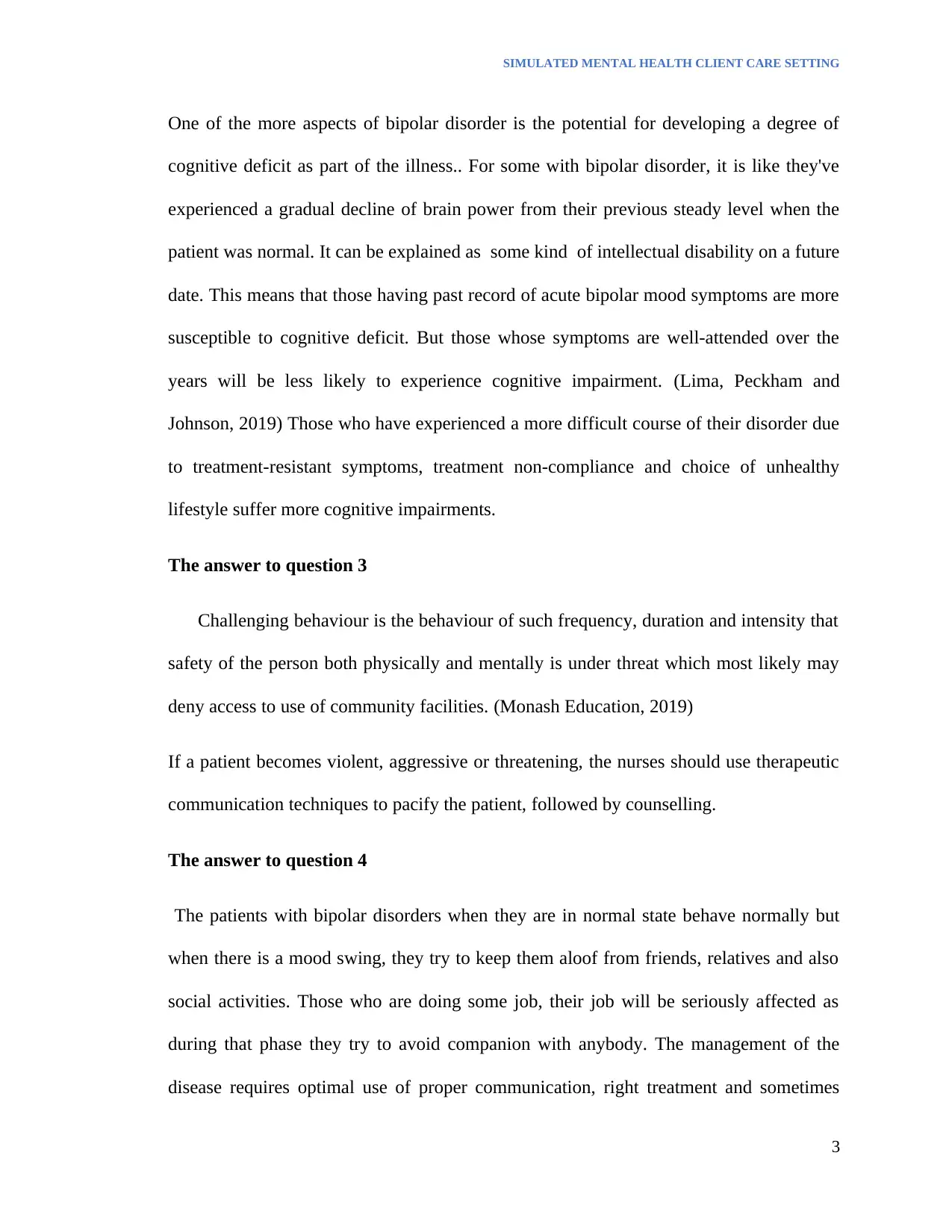
SIMULATED MENTAL HEALTH CLIENT CARE SETTING
One of the more aspects of bipolar disorder is the potential for developing a degree of
cognitive deficit as part of the illness.. For some with bipolar disorder, it is like they've
experienced a gradual decline of brain power from their previous steady level when the
patient was normal. It can be explained as some kind of intellectual disability on a future
date. This means that those having past record of acute bipolar mood symptoms are more
susceptible to cognitive deficit. But those whose symptoms are well-attended over the
years will be less likely to experience cognitive impairment. (Lima, Peckham and
Johnson, 2019) Those who have experienced a more difficult course of their disorder due
to treatment-resistant symptoms, treatment non-compliance and choice of unhealthy
lifestyle suffer more cognitive impairments.
The answer to question 3
Challenging behaviour is the behaviour of such frequency, duration and intensity that
safety of the person both physically and mentally is under threat which most likely may
deny access to use of community facilities. (Monash Education, 2019)
If a patient becomes violent, aggressive or threatening, the nurses should use therapeutic
communication techniques to pacify the patient, followed by counselling.
The answer to question 4
The patients with bipolar disorders when they are in normal state behave normally but
when there is a mood swing, they try to keep them aloof from friends, relatives and also
social activities. Those who are doing some job, their job will be seriously affected as
during that phase they try to avoid companion with anybody. The management of the
disease requires optimal use of proper communication, right treatment and sometimes
3
One of the more aspects of bipolar disorder is the potential for developing a degree of
cognitive deficit as part of the illness.. For some with bipolar disorder, it is like they've
experienced a gradual decline of brain power from their previous steady level when the
patient was normal. It can be explained as some kind of intellectual disability on a future
date. This means that those having past record of acute bipolar mood symptoms are more
susceptible to cognitive deficit. But those whose symptoms are well-attended over the
years will be less likely to experience cognitive impairment. (Lima, Peckham and
Johnson, 2019) Those who have experienced a more difficult course of their disorder due
to treatment-resistant symptoms, treatment non-compliance and choice of unhealthy
lifestyle suffer more cognitive impairments.
The answer to question 3
Challenging behaviour is the behaviour of such frequency, duration and intensity that
safety of the person both physically and mentally is under threat which most likely may
deny access to use of community facilities. (Monash Education, 2019)
If a patient becomes violent, aggressive or threatening, the nurses should use therapeutic
communication techniques to pacify the patient, followed by counselling.
The answer to question 4
The patients with bipolar disorders when they are in normal state behave normally but
when there is a mood swing, they try to keep them aloof from friends, relatives and also
social activities. Those who are doing some job, their job will be seriously affected as
during that phase they try to avoid companion with anybody. The management of the
disease requires optimal use of proper communication, right treatment and sometimes
3
⊘ This is a preview!⊘
Do you want full access?
Subscribe today to unlock all pages.

Trusted by 1+ million students worldwide
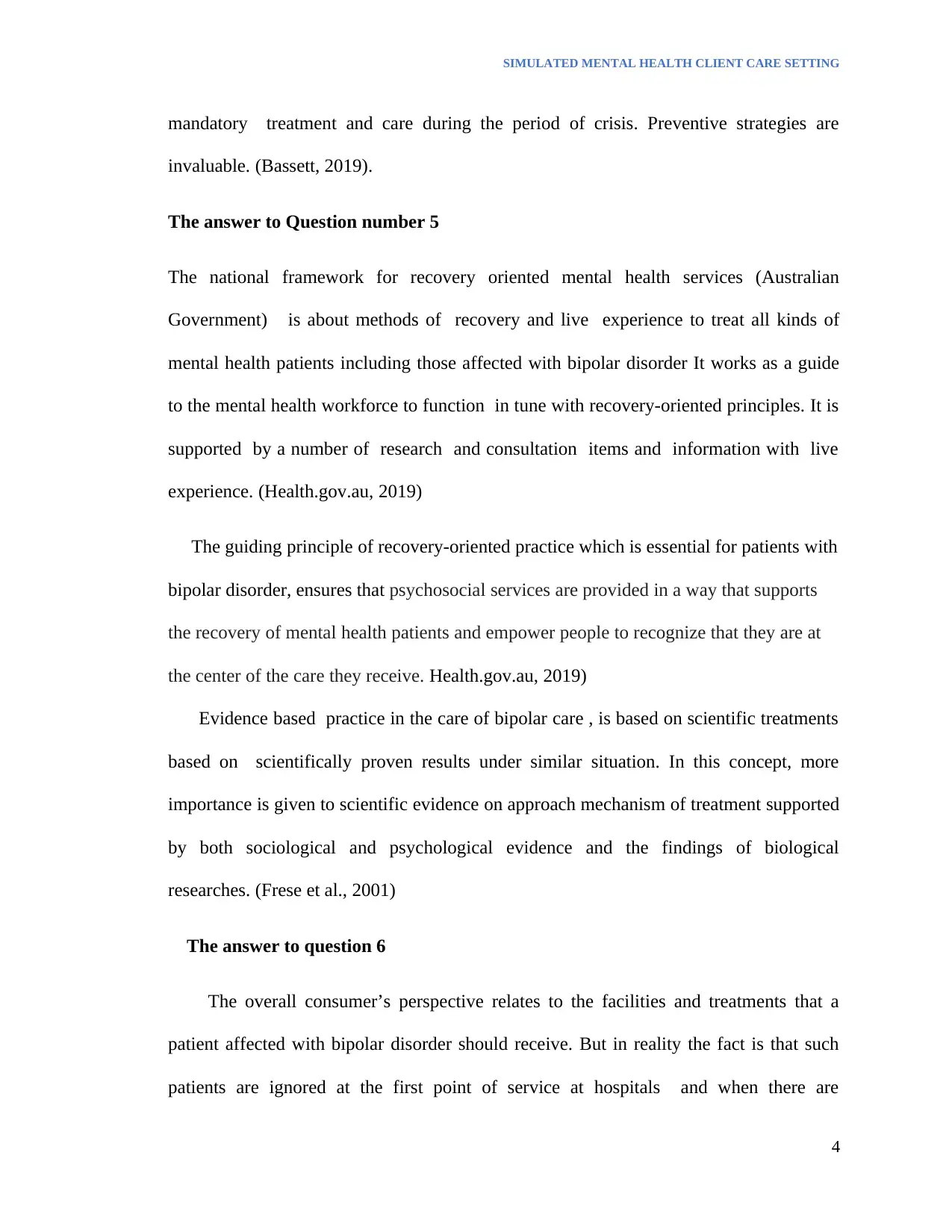
SIMULATED MENTAL HEALTH CLIENT CARE SETTING
mandatory treatment and care during the period of crisis. Preventive strategies are
invaluable. (Bassett, 2019).
The answer to Question number 5
The national framework for recovery oriented mental health services (Australian
Government) is about methods of recovery and live experience to treat all kinds of
mental health patients including those affected with bipolar disorder It works as a guide
to the mental health workforce to function in tune with recovery-oriented principles. It is
supported by a number of research and consultation items and information with live
experience. (Health.gov.au, 2019)
The guiding principle of recovery-oriented practice which is essential for patients with
bipolar disorder, ensures that psychosocial services are provided in a way that supports
the recovery of mental health patients and empower people to recognize that they are at
the center of the care they receive. Health.gov.au, 2019)
Evidence based practice in the care of bipolar care , is based on scientific treatments
based on scientifically proven results under similar situation. In this concept, more
importance is given to scientific evidence on approach mechanism of treatment supported
by both sociological and psychological evidence and the findings of biological
researches. (Frese et al., 2001)
The answer to question 6
The overall consumer’s perspective relates to the facilities and treatments that a
patient affected with bipolar disorder should receive. But in reality the fact is that such
patients are ignored at the first point of service at hospitals and when there are
4
mandatory treatment and care during the period of crisis. Preventive strategies are
invaluable. (Bassett, 2019).
The answer to Question number 5
The national framework for recovery oriented mental health services (Australian
Government) is about methods of recovery and live experience to treat all kinds of
mental health patients including those affected with bipolar disorder It works as a guide
to the mental health workforce to function in tune with recovery-oriented principles. It is
supported by a number of research and consultation items and information with live
experience. (Health.gov.au, 2019)
The guiding principle of recovery-oriented practice which is essential for patients with
bipolar disorder, ensures that psychosocial services are provided in a way that supports
the recovery of mental health patients and empower people to recognize that they are at
the center of the care they receive. Health.gov.au, 2019)
Evidence based practice in the care of bipolar care , is based on scientific treatments
based on scientifically proven results under similar situation. In this concept, more
importance is given to scientific evidence on approach mechanism of treatment supported
by both sociological and psychological evidence and the findings of biological
researches. (Frese et al., 2001)
The answer to question 6
The overall consumer’s perspective relates to the facilities and treatments that a
patient affected with bipolar disorder should receive. But in reality the fact is that such
patients are ignored at the first point of service at hospitals and when there are
4
Paraphrase This Document
Need a fresh take? Get an instant paraphrase of this document with our AI Paraphraser
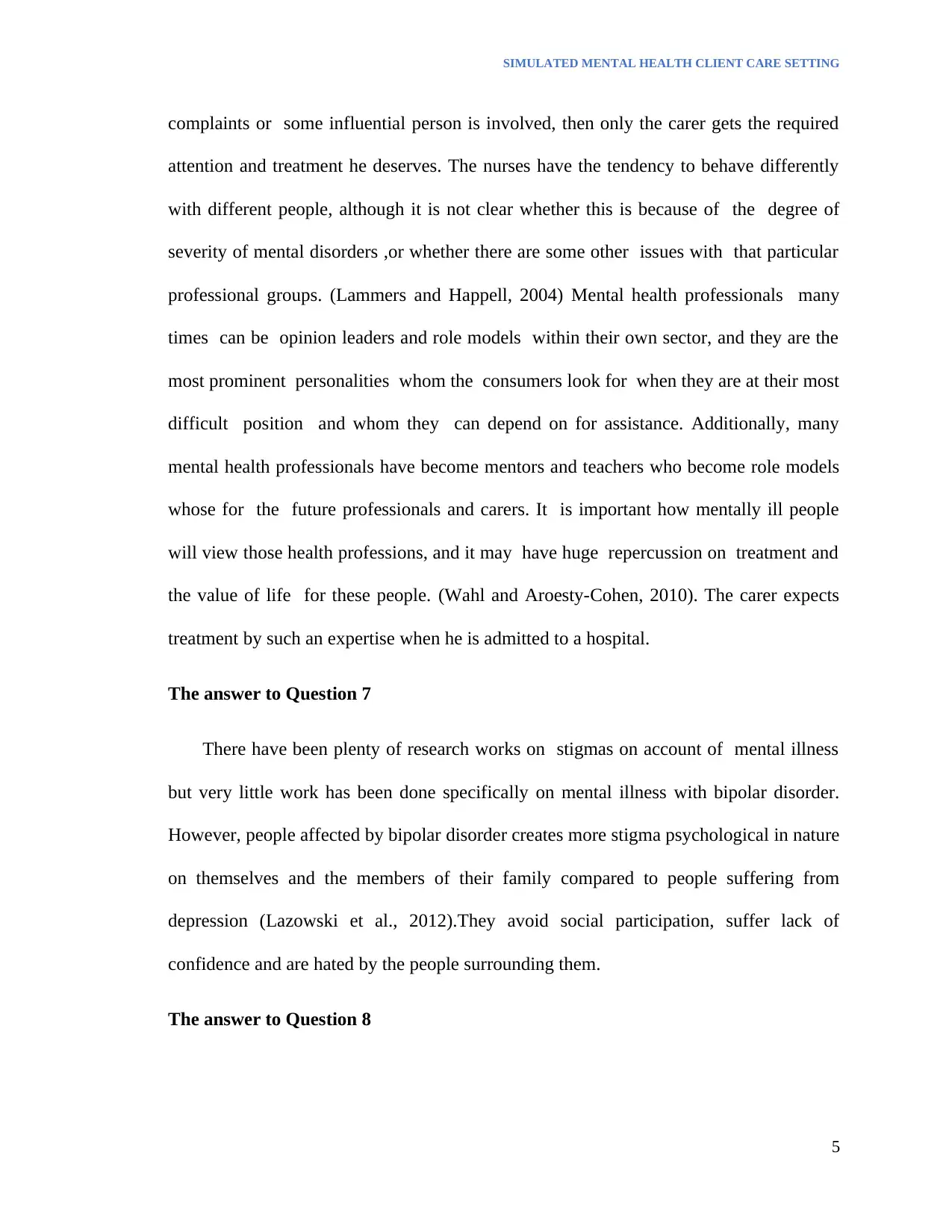
SIMULATED MENTAL HEALTH CLIENT CARE SETTING
complaints or some influential person is involved, then only the carer gets the required
attention and treatment he deserves. The nurses have the tendency to behave differently
with different people, although it is not clear whether this is because of the degree of
severity of mental disorders ,or whether there are some other issues with that particular
professional groups. (Lammers and Happell, 2004) Mental health professionals many
times can be opinion leaders and role models within their own sector, and they are the
most prominent personalities whom the consumers look for when they are at their most
difficult position and whom they can depend on for assistance. Additionally, many
mental health professionals have become mentors and teachers who become role models
whose for the future professionals and carers. It is important how mentally ill people
will view those health professions, and it may have huge repercussion on treatment and
the value of life for these people. (Wahl and Aroesty-Cohen, 2010). The carer expects
treatment by such an expertise when he is admitted to a hospital.
The answer to Question 7
There have been plenty of research works on stigmas on account of mental illness
but very little work has been done specifically on mental illness with bipolar disorder.
However, people affected by bipolar disorder creates more stigma psychological in nature
on themselves and the members of their family compared to people suffering from
depression (Lazowski et al., 2012).They avoid social participation, suffer lack of
confidence and are hated by the people surrounding them.
The answer to Question 8
5
complaints or some influential person is involved, then only the carer gets the required
attention and treatment he deserves. The nurses have the tendency to behave differently
with different people, although it is not clear whether this is because of the degree of
severity of mental disorders ,or whether there are some other issues with that particular
professional groups. (Lammers and Happell, 2004) Mental health professionals many
times can be opinion leaders and role models within their own sector, and they are the
most prominent personalities whom the consumers look for when they are at their most
difficult position and whom they can depend on for assistance. Additionally, many
mental health professionals have become mentors and teachers who become role models
whose for the future professionals and carers. It is important how mentally ill people
will view those health professions, and it may have huge repercussion on treatment and
the value of life for these people. (Wahl and Aroesty-Cohen, 2010). The carer expects
treatment by such an expertise when he is admitted to a hospital.
The answer to Question 7
There have been plenty of research works on stigmas on account of mental illness
but very little work has been done specifically on mental illness with bipolar disorder.
However, people affected by bipolar disorder creates more stigma psychological in nature
on themselves and the members of their family compared to people suffering from
depression (Lazowski et al., 2012).They avoid social participation, suffer lack of
confidence and are hated by the people surrounding them.
The answer to Question 8
5
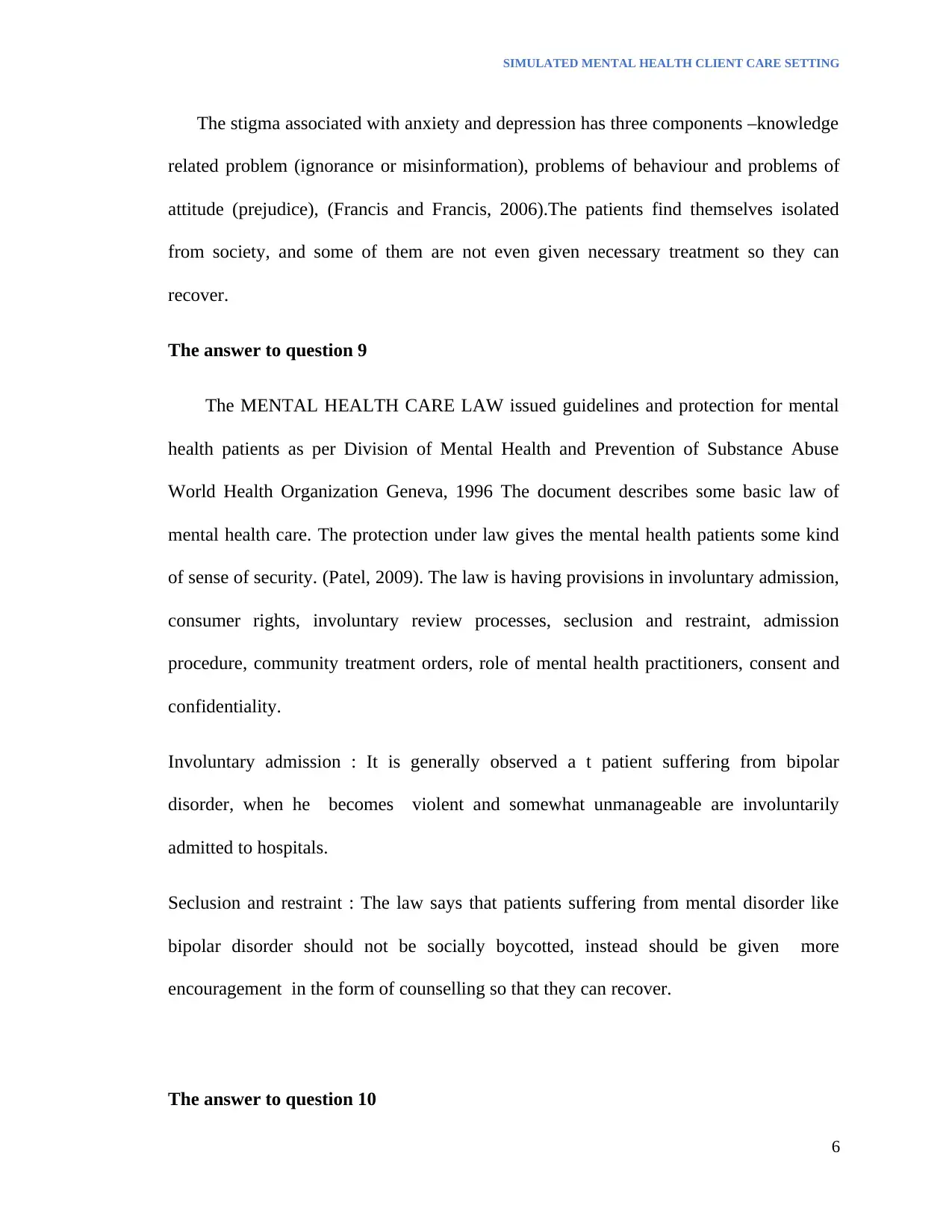
SIMULATED MENTAL HEALTH CLIENT CARE SETTING
The stigma associated with anxiety and depression has three components –knowledge
related problem (ignorance or misinformation), problems of behaviour and problems of
attitude (prejudice), (Francis and Francis, 2006).The patients find themselves isolated
from society, and some of them are not even given necessary treatment so they can
recover.
The answer to question 9
The MENTAL HEALTH CARE LAW issued guidelines and protection for mental
health patients as per Division of Mental Health and Prevention of Substance Abuse
World Health Organization Geneva, 1996 The document describes some basic law of
mental health care. The protection under law gives the mental health patients some kind
of sense of security. (Patel, 2009). The law is having provisions in involuntary admission,
consumer rights, involuntary review processes, seclusion and restraint, admission
procedure, community treatment orders, role of mental health practitioners, consent and
confidentiality.
Involuntary admission : It is generally observed a t patient suffering from bipolar
disorder, when he becomes violent and somewhat unmanageable are involuntarily
admitted to hospitals.
Seclusion and restraint : The law says that patients suffering from mental disorder like
bipolar disorder should not be socially boycotted, instead should be given more
encouragement in the form of counselling so that they can recover.
The answer to question 10
6
The stigma associated with anxiety and depression has three components –knowledge
related problem (ignorance or misinformation), problems of behaviour and problems of
attitude (prejudice), (Francis and Francis, 2006).The patients find themselves isolated
from society, and some of them are not even given necessary treatment so they can
recover.
The answer to question 9
The MENTAL HEALTH CARE LAW issued guidelines and protection for mental
health patients as per Division of Mental Health and Prevention of Substance Abuse
World Health Organization Geneva, 1996 The document describes some basic law of
mental health care. The protection under law gives the mental health patients some kind
of sense of security. (Patel, 2009). The law is having provisions in involuntary admission,
consumer rights, involuntary review processes, seclusion and restraint, admission
procedure, community treatment orders, role of mental health practitioners, consent and
confidentiality.
Involuntary admission : It is generally observed a t patient suffering from bipolar
disorder, when he becomes violent and somewhat unmanageable are involuntarily
admitted to hospitals.
Seclusion and restraint : The law says that patients suffering from mental disorder like
bipolar disorder should not be socially boycotted, instead should be given more
encouragement in the form of counselling so that they can recover.
The answer to question 10
6
⊘ This is a preview!⊘
Do you want full access?
Subscribe today to unlock all pages.

Trusted by 1+ million students worldwide
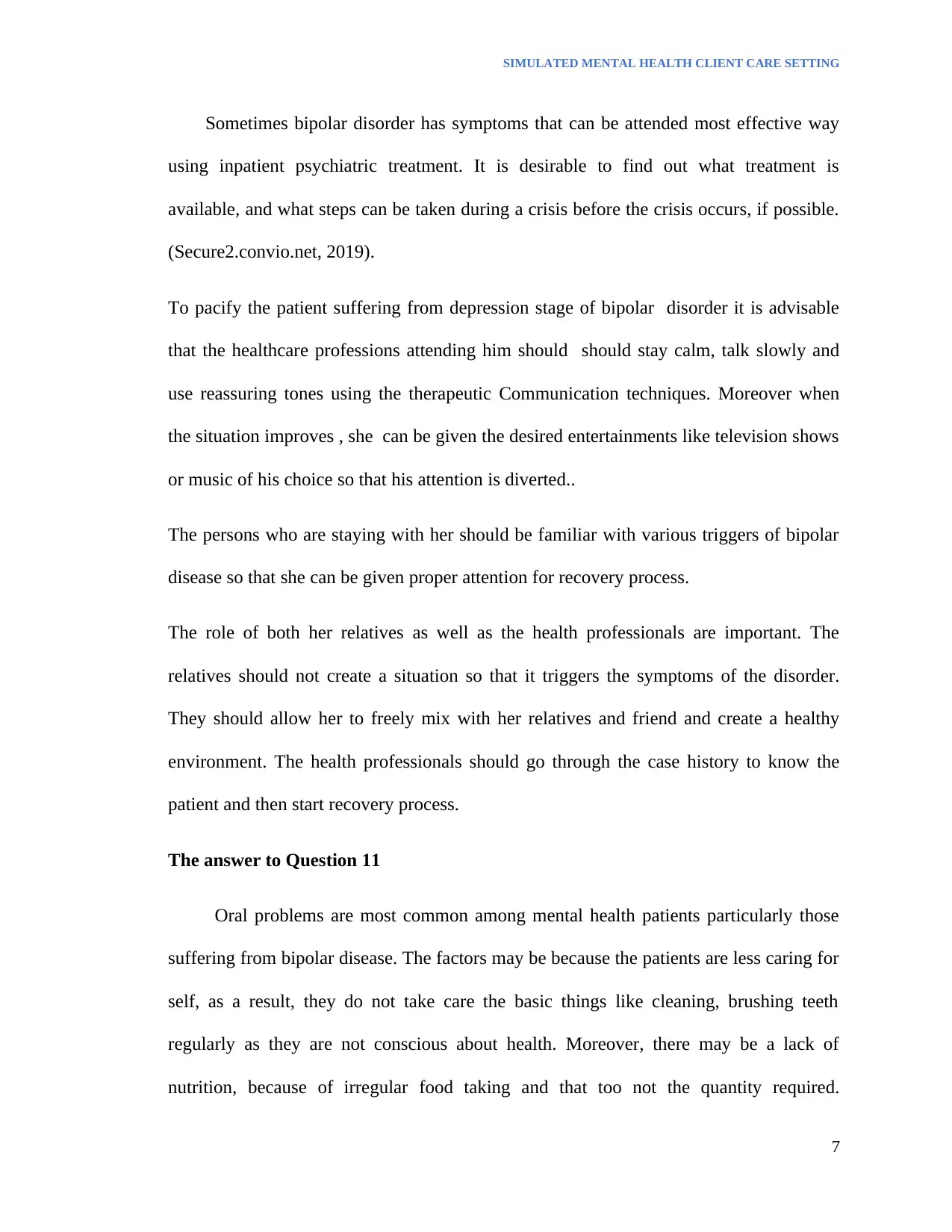
SIMULATED MENTAL HEALTH CLIENT CARE SETTING
Sometimes bipolar disorder has symptoms that can be attended most effective way
using inpatient psychiatric treatment. It is desirable to find out what treatment is
available, and what steps can be taken during a crisis before the crisis occurs, if possible.
(Secure2.convio.net, 2019).
To pacify the patient suffering from depression stage of bipolar disorder it is advisable
that the healthcare professions attending him should should stay calm, talk slowly and
use reassuring tones using the therapeutic Communication techniques. Moreover when
the situation improves , she can be given the desired entertainments like television shows
or music of his choice so that his attention is diverted..
The persons who are staying with her should be familiar with various triggers of bipolar
disease so that she can be given proper attention for recovery process.
The role of both her relatives as well as the health professionals are important. The
relatives should not create a situation so that it triggers the symptoms of the disorder.
They should allow her to freely mix with her relatives and friend and create a healthy
environment. The health professionals should go through the case history to know the
patient and then start recovery process.
The answer to Question 11
Oral problems are most common among mental health patients particularly those
suffering from bipolar disease. The factors may be because the patients are less caring for
self, as a result, they do not take care the basic things like cleaning, brushing teeth
regularly as they are not conscious about health. Moreover, there may be a lack of
nutrition, because of irregular food taking and that too not the quantity required.
7
Sometimes bipolar disorder has symptoms that can be attended most effective way
using inpatient psychiatric treatment. It is desirable to find out what treatment is
available, and what steps can be taken during a crisis before the crisis occurs, if possible.
(Secure2.convio.net, 2019).
To pacify the patient suffering from depression stage of bipolar disorder it is advisable
that the healthcare professions attending him should should stay calm, talk slowly and
use reassuring tones using the therapeutic Communication techniques. Moreover when
the situation improves , she can be given the desired entertainments like television shows
or music of his choice so that his attention is diverted..
The persons who are staying with her should be familiar with various triggers of bipolar
disease so that she can be given proper attention for recovery process.
The role of both her relatives as well as the health professionals are important. The
relatives should not create a situation so that it triggers the symptoms of the disorder.
They should allow her to freely mix with her relatives and friend and create a healthy
environment. The health professionals should go through the case history to know the
patient and then start recovery process.
The answer to Question 11
Oral problems are most common among mental health patients particularly those
suffering from bipolar disease. The factors may be because the patients are less caring for
self, as a result, they do not take care the basic things like cleaning, brushing teeth
regularly as they are not conscious about health. Moreover, there may be a lack of
nutrition, because of irregular food taking and that too not the quantity required.
7
Paraphrase This Document
Need a fresh take? Get an instant paraphrase of this document with our AI Paraphraser
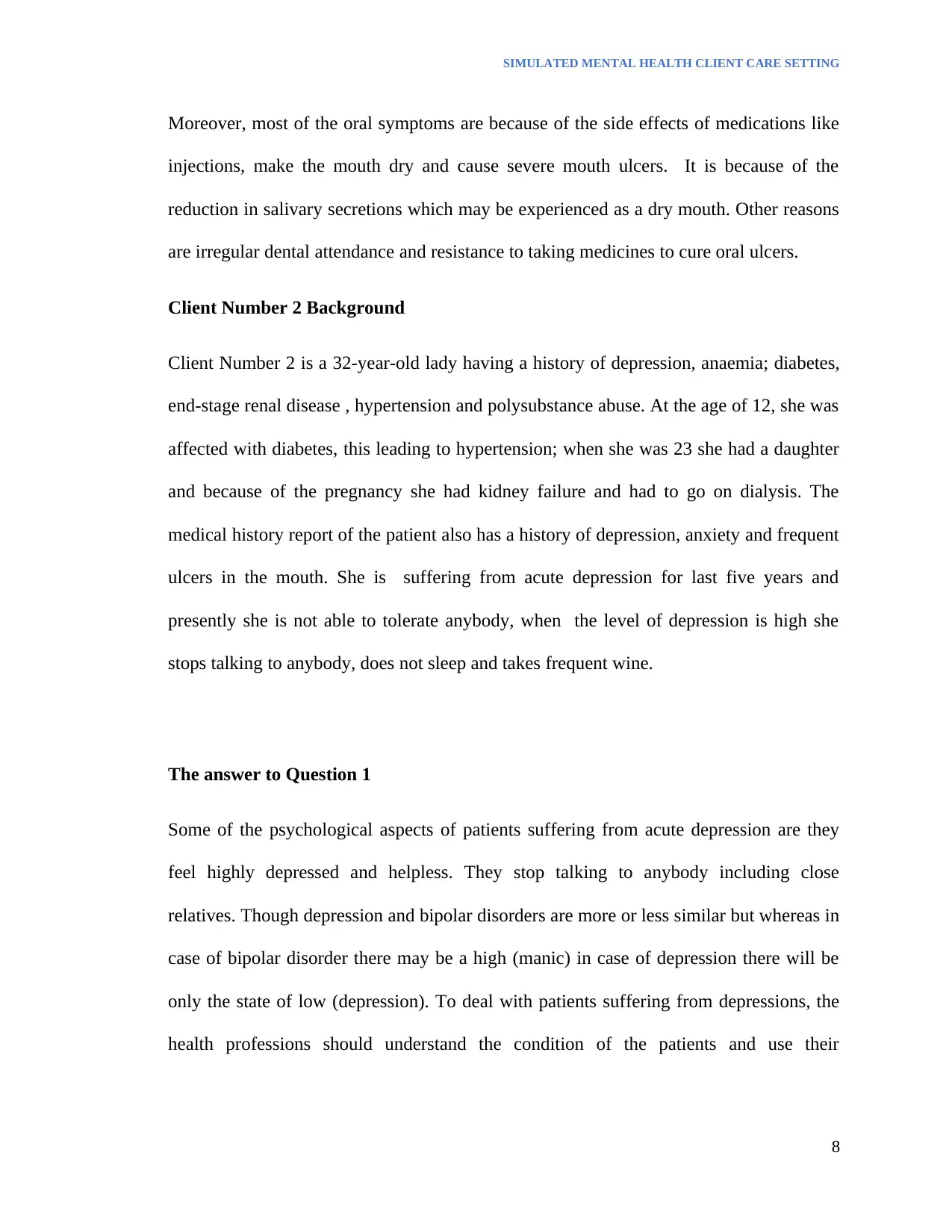
SIMULATED MENTAL HEALTH CLIENT CARE SETTING
Moreover, most of the oral symptoms are because of the side effects of medications like
injections, make the mouth dry and cause severe mouth ulcers. It is because of the
reduction in salivary secretions which may be experienced as a dry mouth. Other reasons
are irregular dental attendance and resistance to taking medicines to cure oral ulcers.
Client Number 2 Background
Client Number 2 is a 32-year-old lady having a history of depression, anaemia; diabetes,
end-stage renal disease , hypertension and polysubstance abuse. At the age of 12, she was
affected with diabetes, this leading to hypertension; when she was 23 she had a daughter
and because of the pregnancy she had kidney failure and had to go on dialysis. The
medical history report of the patient also has a history of depression, anxiety and frequent
ulcers in the mouth. She is suffering from acute depression for last five years and
presently she is not able to tolerate anybody, when the level of depression is high she
stops talking to anybody, does not sleep and takes frequent wine.
The answer to Question 1
Some of the psychological aspects of patients suffering from acute depression are they
feel highly depressed and helpless. They stop talking to anybody including close
relatives. Though depression and bipolar disorders are more or less similar but whereas in
case of bipolar disorder there may be a high (manic) in case of depression there will be
only the state of low (depression). To deal with patients suffering from depressions, the
health professions should understand the condition of the patients and use their
8
Moreover, most of the oral symptoms are because of the side effects of medications like
injections, make the mouth dry and cause severe mouth ulcers. It is because of the
reduction in salivary secretions which may be experienced as a dry mouth. Other reasons
are irregular dental attendance and resistance to taking medicines to cure oral ulcers.
Client Number 2 Background
Client Number 2 is a 32-year-old lady having a history of depression, anaemia; diabetes,
end-stage renal disease , hypertension and polysubstance abuse. At the age of 12, she was
affected with diabetes, this leading to hypertension; when she was 23 she had a daughter
and because of the pregnancy she had kidney failure and had to go on dialysis. The
medical history report of the patient also has a history of depression, anxiety and frequent
ulcers in the mouth. She is suffering from acute depression for last five years and
presently she is not able to tolerate anybody, when the level of depression is high she
stops talking to anybody, does not sleep and takes frequent wine.
The answer to Question 1
Some of the psychological aspects of patients suffering from acute depression are they
feel highly depressed and helpless. They stop talking to anybody including close
relatives. Though depression and bipolar disorders are more or less similar but whereas in
case of bipolar disorder there may be a high (manic) in case of depression there will be
only the state of low (depression). To deal with patients suffering from depressions, the
health professions should understand the condition of the patients and use their
8
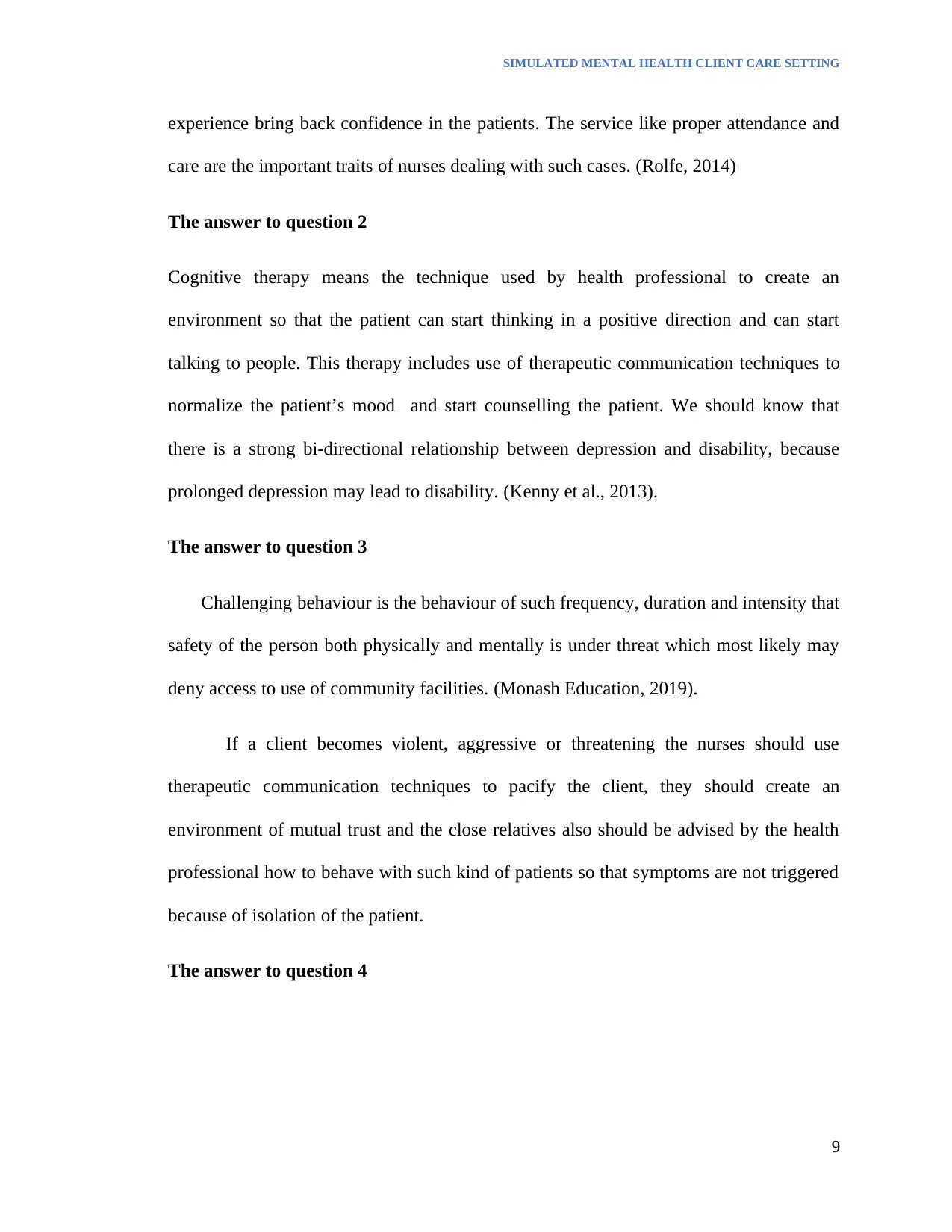
SIMULATED MENTAL HEALTH CLIENT CARE SETTING
experience bring back confidence in the patients. The service like proper attendance and
care are the important traits of nurses dealing with such cases. (Rolfe, 2014)
The answer to question 2
Cognitive therapy means the technique used by health professional to create an
environment so that the patient can start thinking in a positive direction and can start
talking to people. This therapy includes use of therapeutic communication techniques to
normalize the patient’s mood and start counselling the patient. We should know that
there is a strong bi-directional relationship between depression and disability, because
prolonged depression may lead to disability. (Kenny et al., 2013).
The answer to question 3
Challenging behaviour is the behaviour of such frequency, duration and intensity that
safety of the person both physically and mentally is under threat which most likely may
deny access to use of community facilities. (Monash Education, 2019).
If a client becomes violent, aggressive or threatening the nurses should use
therapeutic communication techniques to pacify the client, they should create an
environment of mutual trust and the close relatives also should be advised by the health
professional how to behave with such kind of patients so that symptoms are not triggered
because of isolation of the patient.
The answer to question 4
9
experience bring back confidence in the patients. The service like proper attendance and
care are the important traits of nurses dealing with such cases. (Rolfe, 2014)
The answer to question 2
Cognitive therapy means the technique used by health professional to create an
environment so that the patient can start thinking in a positive direction and can start
talking to people. This therapy includes use of therapeutic communication techniques to
normalize the patient’s mood and start counselling the patient. We should know that
there is a strong bi-directional relationship between depression and disability, because
prolonged depression may lead to disability. (Kenny et al., 2013).
The answer to question 3
Challenging behaviour is the behaviour of such frequency, duration and intensity that
safety of the person both physically and mentally is under threat which most likely may
deny access to use of community facilities. (Monash Education, 2019).
If a client becomes violent, aggressive or threatening the nurses should use
therapeutic communication techniques to pacify the client, they should create an
environment of mutual trust and the close relatives also should be advised by the health
professional how to behave with such kind of patients so that symptoms are not triggered
because of isolation of the patient.
The answer to question 4
9
⊘ This is a preview!⊘
Do you want full access?
Subscribe today to unlock all pages.

Trusted by 1+ million students worldwide
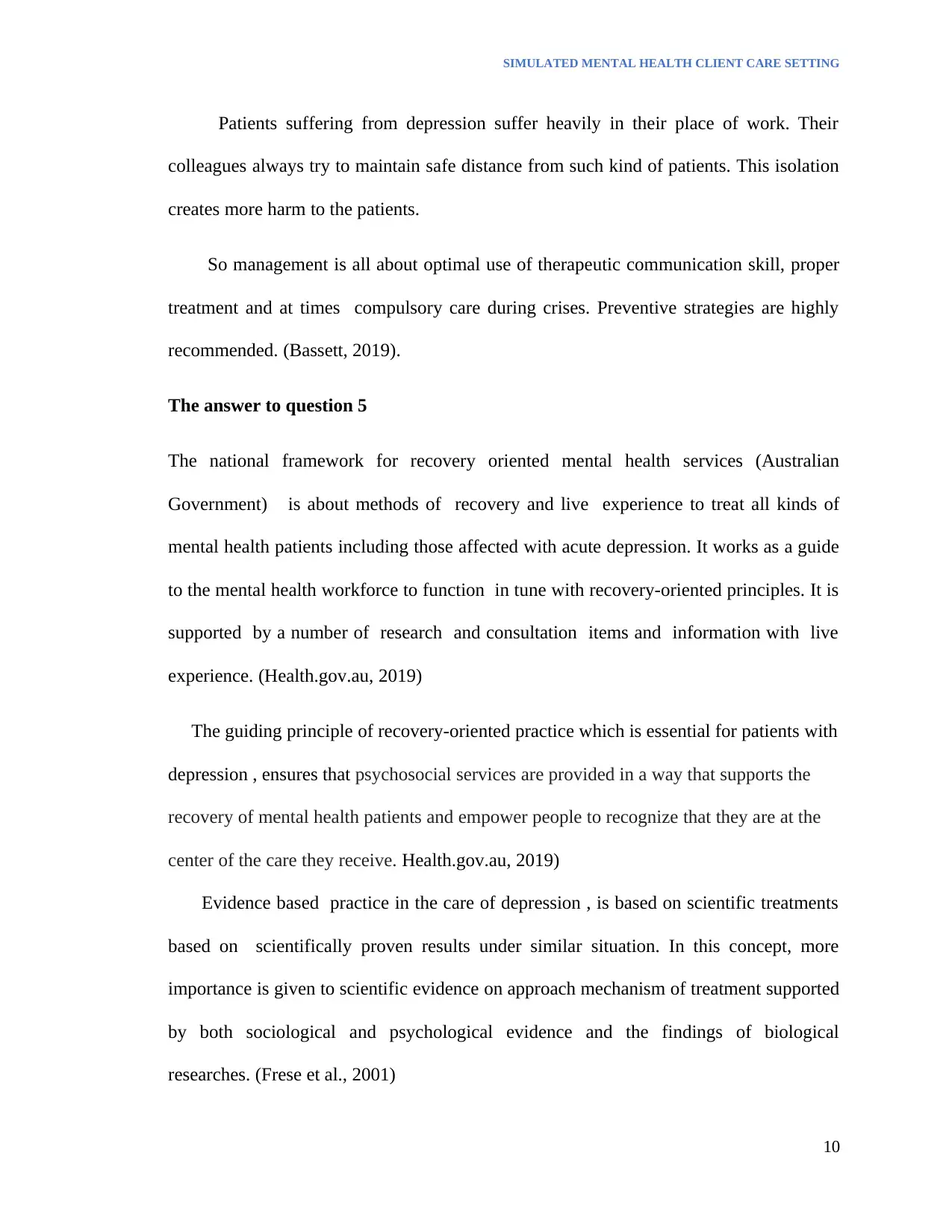
SIMULATED MENTAL HEALTH CLIENT CARE SETTING
Patients suffering from depression suffer heavily in their place of work. Their
colleagues always try to maintain safe distance from such kind of patients. This isolation
creates more harm to the patients.
So management is all about optimal use of therapeutic communication skill, proper
treatment and at times compulsory care during crises. Preventive strategies are highly
recommended. (Bassett, 2019).
The answer to question 5
The national framework for recovery oriented mental health services (Australian
Government) is about methods of recovery and live experience to treat all kinds of
mental health patients including those affected with acute depression. It works as a guide
to the mental health workforce to function in tune with recovery-oriented principles. It is
supported by a number of research and consultation items and information with live
experience. (Health.gov.au, 2019)
The guiding principle of recovery-oriented practice which is essential for patients with
depression , ensures that psychosocial services are provided in a way that supports the
recovery of mental health patients and empower people to recognize that they are at the
center of the care they receive. Health.gov.au, 2019)
Evidence based practice in the care of depression , is based on scientific treatments
based on scientifically proven results under similar situation. In this concept, more
importance is given to scientific evidence on approach mechanism of treatment supported
by both sociological and psychological evidence and the findings of biological
researches. (Frese et al., 2001)
10
Patients suffering from depression suffer heavily in their place of work. Their
colleagues always try to maintain safe distance from such kind of patients. This isolation
creates more harm to the patients.
So management is all about optimal use of therapeutic communication skill, proper
treatment and at times compulsory care during crises. Preventive strategies are highly
recommended. (Bassett, 2019).
The answer to question 5
The national framework for recovery oriented mental health services (Australian
Government) is about methods of recovery and live experience to treat all kinds of
mental health patients including those affected with acute depression. It works as a guide
to the mental health workforce to function in tune with recovery-oriented principles. It is
supported by a number of research and consultation items and information with live
experience. (Health.gov.au, 2019)
The guiding principle of recovery-oriented practice which is essential for patients with
depression , ensures that psychosocial services are provided in a way that supports the
recovery of mental health patients and empower people to recognize that they are at the
center of the care they receive. Health.gov.au, 2019)
Evidence based practice in the care of depression , is based on scientific treatments
based on scientifically proven results under similar situation. In this concept, more
importance is given to scientific evidence on approach mechanism of treatment supported
by both sociological and psychological evidence and the findings of biological
researches. (Frese et al., 2001)
10
Paraphrase This Document
Need a fresh take? Get an instant paraphrase of this document with our AI Paraphraser
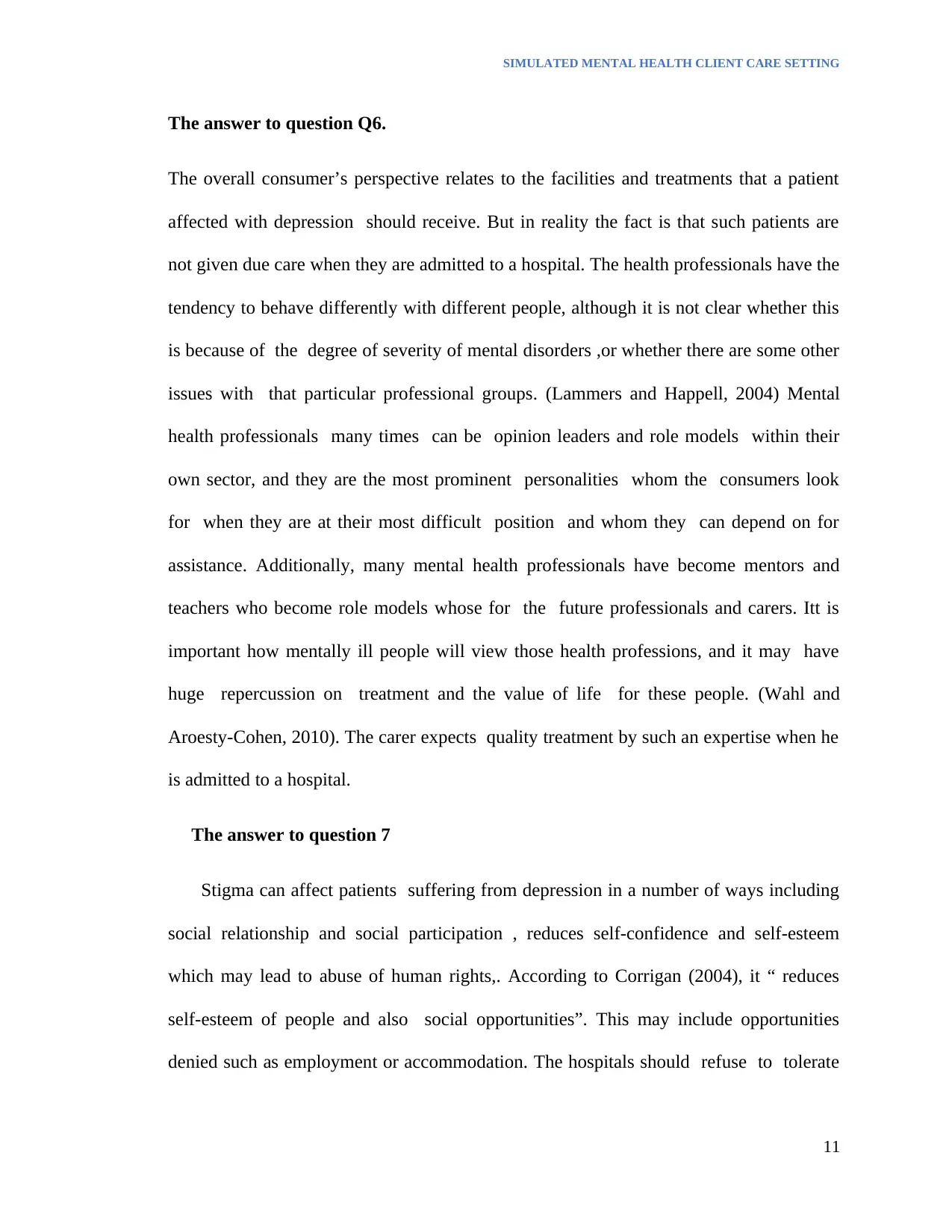
SIMULATED MENTAL HEALTH CLIENT CARE SETTING
The answer to question Q6.
The overall consumer’s perspective relates to the facilities and treatments that a patient
affected with depression should receive. But in reality the fact is that such patients are
not given due care when they are admitted to a hospital. The health professionals have the
tendency to behave differently with different people, although it is not clear whether this
is because of the degree of severity of mental disorders ,or whether there are some other
issues with that particular professional groups. (Lammers and Happell, 2004) Mental
health professionals many times can be opinion leaders and role models within their
own sector, and they are the most prominent personalities whom the consumers look
for when they are at their most difficult position and whom they can depend on for
assistance. Additionally, many mental health professionals have become mentors and
teachers who become role models whose for the future professionals and carers. Itt is
important how mentally ill people will view those health professions, and it may have
huge repercussion on treatment and the value of life for these people. (Wahl and
Aroesty-Cohen, 2010). The carer expects quality treatment by such an expertise when he
is admitted to a hospital.
The answer to question 7
Stigma can affect patients suffering from depression in a number of ways including
social relationship and social participation , reduces self-confidence and self-esteem
which may lead to abuse of human rights,. According to Corrigan (2004), it “ reduces
self-esteem of people and also social opportunities”. This may include opportunities
denied such as employment or accommodation. The hospitals should refuse to tolerate
11
The answer to question Q6.
The overall consumer’s perspective relates to the facilities and treatments that a patient
affected with depression should receive. But in reality the fact is that such patients are
not given due care when they are admitted to a hospital. The health professionals have the
tendency to behave differently with different people, although it is not clear whether this
is because of the degree of severity of mental disorders ,or whether there are some other
issues with that particular professional groups. (Lammers and Happell, 2004) Mental
health professionals many times can be opinion leaders and role models within their
own sector, and they are the most prominent personalities whom the consumers look
for when they are at their most difficult position and whom they can depend on for
assistance. Additionally, many mental health professionals have become mentors and
teachers who become role models whose for the future professionals and carers. Itt is
important how mentally ill people will view those health professions, and it may have
huge repercussion on treatment and the value of life for these people. (Wahl and
Aroesty-Cohen, 2010). The carer expects quality treatment by such an expertise when he
is admitted to a hospital.
The answer to question 7
Stigma can affect patients suffering from depression in a number of ways including
social relationship and social participation , reduces self-confidence and self-esteem
which may lead to abuse of human rights,. According to Corrigan (2004), it “ reduces
self-esteem of people and also social opportunities”. This may include opportunities
denied such as employment or accommodation. The hospitals should refuse to tolerate
11
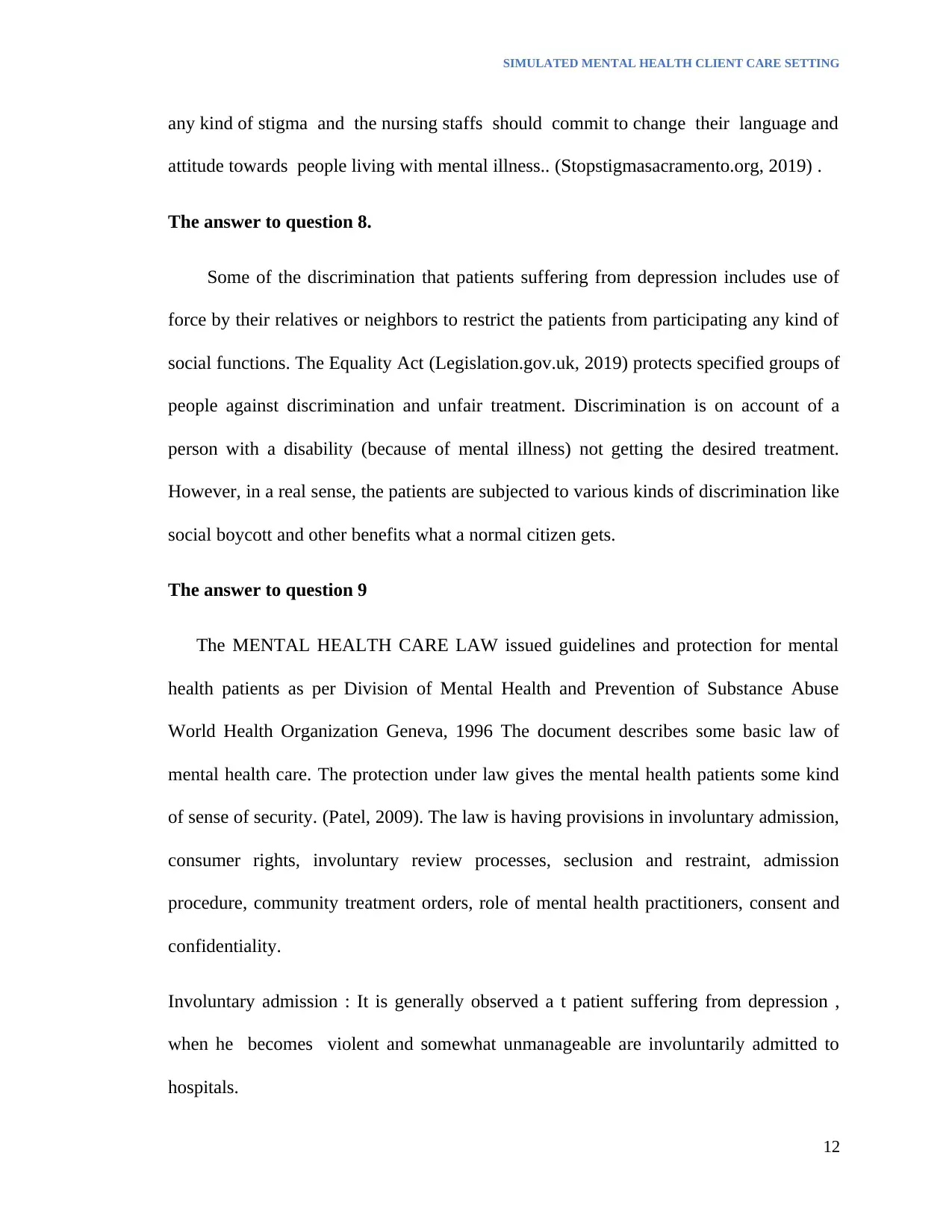
SIMULATED MENTAL HEALTH CLIENT CARE SETTING
any kind of stigma and the nursing staffs should commit to change their language and
attitude towards people living with mental illness.. (Stopstigmasacramento.org, 2019) .
The answer to question 8.
Some of the discrimination that patients suffering from depression includes use of
force by their relatives or neighbors to restrict the patients from participating any kind of
social functions. The Equality Act (Legislation.gov.uk, 2019) protects specified groups of
people against discrimination and unfair treatment. Discrimination is on account of a
person with a disability (because of mental illness) not getting the desired treatment.
However, in a real sense, the patients are subjected to various kinds of discrimination like
social boycott and other benefits what a normal citizen gets.
The answer to question 9
The MENTAL HEALTH CARE LAW issued guidelines and protection for mental
health patients as per Division of Mental Health and Prevention of Substance Abuse
World Health Organization Geneva, 1996 The document describes some basic law of
mental health care. The protection under law gives the mental health patients some kind
of sense of security. (Patel, 2009). The law is having provisions in involuntary admission,
consumer rights, involuntary review processes, seclusion and restraint, admission
procedure, community treatment orders, role of mental health practitioners, consent and
confidentiality.
Involuntary admission : It is generally observed a t patient suffering from depression ,
when he becomes violent and somewhat unmanageable are involuntarily admitted to
hospitals.
12
any kind of stigma and the nursing staffs should commit to change their language and
attitude towards people living with mental illness.. (Stopstigmasacramento.org, 2019) .
The answer to question 8.
Some of the discrimination that patients suffering from depression includes use of
force by their relatives or neighbors to restrict the patients from participating any kind of
social functions. The Equality Act (Legislation.gov.uk, 2019) protects specified groups of
people against discrimination and unfair treatment. Discrimination is on account of a
person with a disability (because of mental illness) not getting the desired treatment.
However, in a real sense, the patients are subjected to various kinds of discrimination like
social boycott and other benefits what a normal citizen gets.
The answer to question 9
The MENTAL HEALTH CARE LAW issued guidelines and protection for mental
health patients as per Division of Mental Health and Prevention of Substance Abuse
World Health Organization Geneva, 1996 The document describes some basic law of
mental health care. The protection under law gives the mental health patients some kind
of sense of security. (Patel, 2009). The law is having provisions in involuntary admission,
consumer rights, involuntary review processes, seclusion and restraint, admission
procedure, community treatment orders, role of mental health practitioners, consent and
confidentiality.
Involuntary admission : It is generally observed a t patient suffering from depression ,
when he becomes violent and somewhat unmanageable are involuntarily admitted to
hospitals.
12
⊘ This is a preview!⊘
Do you want full access?
Subscribe today to unlock all pages.

Trusted by 1+ million students worldwide
1 out of 18
Related Documents
Your All-in-One AI-Powered Toolkit for Academic Success.
+13062052269
info@desklib.com
Available 24*7 on WhatsApp / Email
![[object Object]](/_next/static/media/star-bottom.7253800d.svg)
Unlock your academic potential
Copyright © 2020–2026 A2Z Services. All Rights Reserved. Developed and managed by ZUCOL.





